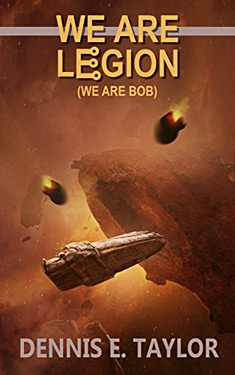Dennis E.
Taylor
Completed 4/30/2018,
Reviewed 5/1/2018
4 stars
This was a fun book.
At times, the science got a little hard, particularly during battle
scenes. But overall the book was quite
enjoyable, especially after reading a couple of heavy novels. It’s not great literature, but the story
telling kept me riveted. In a way, it
reminded me of The Martian, with its lone man solving lots of complex problems.
It has a lot more humor than The Martian, though, but just as much
suspense. Unfortunately, it’s the first
of a trilogy, so while some of the plotlines come to a conclusion, some are still
open and others are just beginning. It’s
an easy read though and I’ll probably get through the whole trilogy, especially
since I already accidently bought the second book.
Bob is a software engineer in the present day 21st
century. He’s hit by a car and killed,
but his head is cryogenically frozen. He’s
revived in the 22nd century, only to find that his existence has
been transferred to a computer. Unlike
some people who have undergone this process, Bob takes to it very well. The US has become a theocracy and corpsicles
have no rights. They are basically
considered blasphemous, but necessary to run simple robots, still contributing
to society. However, Bob has been
brought back from stasis to run a space probe to find habitable planets,
something that several countries are in a race to win.
The best part of the plot is that in space, Bob has a 3D
printer and a replicator. He creates new
probes that contain copies of himself so that there are numerous Bobs running
around the interstellar neighborhood, hence the title. The Bobs spend their time discovering new
worlds and fending off enemy countries’ probes.
The Bobs all take different names, many based on pop culture references,
particularly Star Trek, comics, and animation.
Of course, for unknown reasons, the Bobs all have different quirks to
their personality even though they are all cloned from the same instance of the
original Bob.
The narrative is really well done. It follows the different Bobs around, all in
first person. It’s pretty easy to follow
the different story lines because each instance of Bob begins a new plot. The two best plots are following the original
Bob and Riker. The original Bob finds a
planet with an emerging sentient life form.
He follows them around, observing their development and worrying about
them as they try to keep from being driven into extinction by a savage species
of gorilla like predators. He struggles
with whether or not to play god and interfere with their natural
development. The Riker plotline has him
and his clones going back to Earth to see how the world has held up. He finds it devastated by nuclear war and
confronted with how to save the remaining few million people left on the
earth.
As I said before, it’s not great literature. It’s a fun, space opera-ish romp through the
galaxy through the eyes of a really smart guy who gets to clone himself over
and over again. It allows for multiple
story lines all told through the same person, more or less. I give the book four stars out of five for
its inventive plot and storytelling style, and of course for the amount of
enjoyment I received reading it.

No comments:
Post a Comment